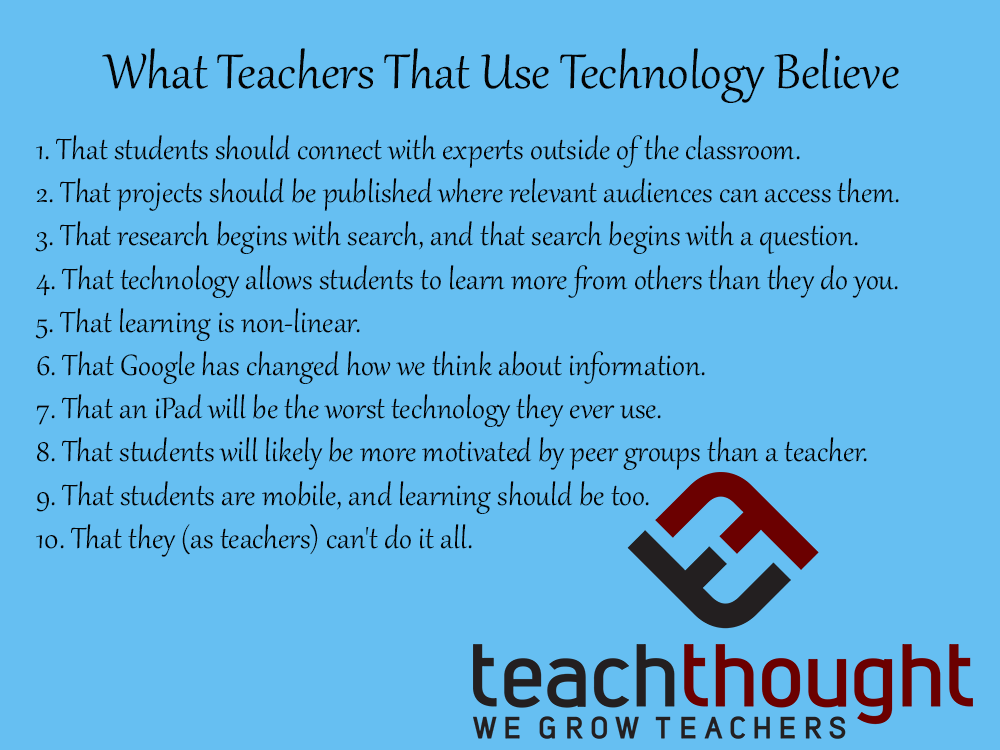
What Do Teachers That Use Technology Believe?
by Terry Heick
What do teachers that use technology believe (as it pertains to teaching with technology)?
This will read a lot like a pro-education technology post because it (more or less) is. I tried to get in the head of both teachers skeptical of ’edtech’ and teachers that have embraced it full-on. I’ve speculated before why some teachers are against technology in learning. This time I thought I’d take a look at the other side and see what kind of beliefs a teacher that uses technology with vision, expertise, or enthusiasm might believe.
Of course, not all of these will be true for all teachers. Many of these can be thought of as underlying assumptions of technology use in learning. It doesn’t mean, though, that these statements are all accurate. This is–as is all reality–a matter of interpretation.
What Teachers That Use Technology Believe
- That students should connect with experts and peers outside of the classroom.
- That artifacts and products of projects should be published where relevant audiences can access them.
- That research begins with search and that search begins with a question.
- That student thinking should be visible.
- That students use technology in their lives, and to create a classroom without it doesn’t make a lot of sense.
- That a classroom, a teacher, and a book or worksheet aren’t the best we can do.
- That learning can start with a book and end up in a digital space. Or vice-versa. Or neither. Or something else.
- That learning through technology is likely more natural for students than teachers
- That technology is a strategy for learning. (It’s not an end, but a means.)
- That if you’re doing to stand between a student and the future (of which technology will be a huge part of), that there had better be a very good reason.
- That digital citizenship is probably misunderstood and underestimated by most school and district policies, academic standards, literacy plans, etc., and that someone should do something about it. (And that they are someone.)
- That students are creative and even visionary, and technology affords endless opportunities to create and produce.
- That smartphones aren’t distractions, but powerful tools for learning.
- That technology can free them to lead learning in new ways as teachers.
- That students should have the opportunity to publish their writing.
- That technology can make learning progress more visible for students.
- That technology allows students to learn more from others than they do you.
- That at one time, a pencil, piece of paper, bookbinding, electricity, and more were all considered ‘new technologies.’
- That adaptive learning apps are only the beginning of how technology will eventually be able to personalize adaptive learning for students.
- That sometimes technology fails, obscures, distracts, costs too much, or otherwise mars an otherwise soundly designed learning experience–just like textbooks, bad lectures, confusing group work, novels well beyond a student’s reading level, hastily-designed projects, and more have done for decades.
- That students are mobile, and learning should be too.
- That the fact that some teachers think carefully about teaching with technology makes sense, but that some refuse to do so is indefensible.
- That a student’s body of work should be accessible and revisited inside and outside of the classroom.
- That learning is non-linear.
- That digital literacy is as important as ‘textual’ literacy.
- That they (as teachers) can’t do it all.
- That Google changes how we think about information.
- That today’s technology–an iPad or iPhone or Chromebook–will be the worst they ever use.
- That it’s not about the teaching, the technology, the strategies, or the design, but rather the long-term influence of knowledge and skills on a student’s inclinations and behavior.
- That students will likely be more motivated by peer groups or authentic audiences than you.
- That digital footprints are important, and so we’d better get ahead of this thing while we can.
- That learning through networks is, at least in part, the future of formal and informal learning.
What Teachers That Use Technology Believe

